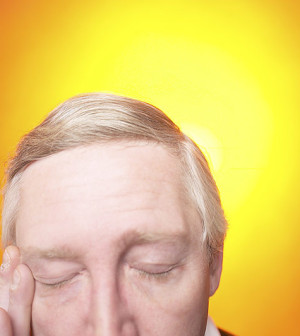- Could Your Grocery Store Meat Be Causing Recurring UTIs?
- Are You Making This Expensive Thermostat Error This Winter?
- Recognizing the Signs of Hypothyroidism
- 10 Strategies to Overcome Insomnia
- Could Artificial Sweeteners Be Aging the Brain Faster?
- Techniques for Soothing Your Nervous System
- Does the Water in Your House Smell Funny? Here’s Why
- Can a Daily Dose of Apple Cider Vinegar Actually Aid Weight Loss?
- 6 Health Beverages That Can Actually Spike Your Blood Sugar
- Treatment Options for Social Anxiety Disorder
Harm From Baseball Concussions May Linger, Study Finds


Even after they’re cleared to play following a concussion, baseball players’ batting skills are worse than normal, which suggests they may not be fully recovered, a new study suggests.
“Although players who sustain a concussion may be symptom-free and cleared by MLB [Major League Baseball] protocol to return to play, the residual effects of concussion on the complex motor skills required for batting may still be a problem,” said principal investigator Dr. Jeffrey Bazarian, an associate professor of emergency medicine at the University of Rochester in New York.
Researchers looked at 59 MLB players who suffered a concussion between 2007 and 2013. During their first two weeks back in action, the players’ batting performances were much poorer than those of 63 players who had been away from the game due to the birth of a child or death of a family member.
The batting averages of the two groups were .234 vs. .264. Their slugging percentages were .359 vs. .420 and their on-base plus slugging percentages were .654 vs. .747, according to the study presented at the recent annual meeting of the American Public Health Association in New Orleans.
A batter’s brain and neural networks have to be in top condition to achieve the hand-eye coordination, reaction time, body stability and balance, and swing control needed to hit a ball that takes about 400 milliseconds to travel from pitcher to batter, Bazarian said in a university news release.
After a concussion, brain function can be impaired for weeks or months. Learning more about how concussions affect batting performance can assist in determining when a concussed player is ready to return to the lineup, the study said.
After strains and bruises, concussions are the most common injuries in professional baseball, accounting for about 2 percent of all injuries that result in loss of playing time. Concussions among high school and college baseball players are rising by about 14 percent a year, the researchers said.
Data and conclusions presented at meetings are usually considered preliminary until published in a peer-reviewed medical journal.
More information
The U.S. Centers for Disease Control and Prevention has more about sports concussions.
Source: HealthDay
Copyright © 2026 HealthDay. All rights reserved.










